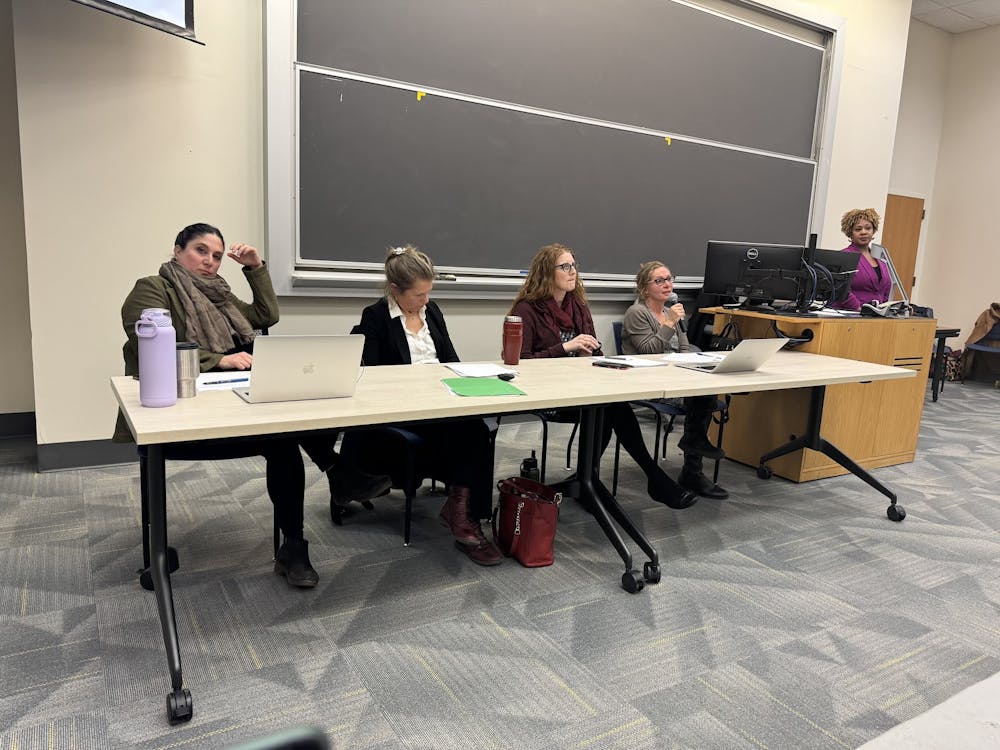By Lauren Diaz
Correspondent
As the war between Israel and Hamas continues, many people, regardless of age, have struggled to make sense of the conflict at hand. With its extensive history — and polarizing sides — it is often difficult to find where to start.
In collaboration with the School of Humanities and Social Sciences and the School of Arts and Communication, the College’s Department of Inclusive Excellence put together a panel to contextualize and explain the complicated relationship between Israel and Palestine on Nov. 15.
In front of a sizable, diverse audience congregated in Physics 101, the panel explained the deep-rooted history of the modern conflict between the Israeli and Palestinian states, which dates back to 1948 with the breakout of the Arab-Israeli War.
The panel featured political science professor Sarah Chartock, international studies professor Miriam Lowi, English professor Mindi McMann and sociology professor Miriam Shakow. The panel and discussion was moderated by Zakiya R. Adair, who is an associate professor of women’s, gender and sexuality studies and African American studies, along with being the co-director of the international studies program.
“We designed this panel as a way to model for the larger TCNJ community how to come together to engage in civil dialogue around difficult subjects,” Adair said to the audience.
Shakow said she joined the panel after seeing the one-sided opinions of not only the campus community, but also the news and media.
“There was a perspective that was missing,” Shakow told The Signal. “It was very upsetting to me that there were groups saying they mourned the Jewish people who died, or they mourned the lives of Palestinians who died, and there were few groups saying that they mourned everyone.”
All four panelists are of Jewish descent, and they clarified that they are not experts on the topic. However, they aimed to take an unbiased approach to presenting their information.
They emphasized that the U.S. is partially responsible for the perpetuation of violence in the Middle East, and it's important to educate yourself, not only on the conflict, but also on how the United States involves itself within it.
The panel is one of three events that the Department of Inclusive Excellence will be hosting to further educate the Campus community on the conflict in Israel and Palestine. The second event will feature a Jewish studies professor and the third event will be delivered by Palestinian scholars.
“I thought that this panel was really informative,” said Erin Ryan, a sophomore secondary history education major. “It gave a less biased outlook on the conflict, and it’s important to keep yourself educated about what’s going on in the world.
The Israeli-Hamas War began on Oct. 7, when Hamas crossed into Israel and led an attack that killed 1,200 Israelis. Over 14,000 Palestinian citizens have died as a result of Israel’s counterattack and invasion of Gaza, according to the New York Times.
Though this war is a polarizing one, the panel put an emphasis on the fact that this is a multifaceted issue that can perpetuate undeserved hatred against one or more groups to spread.
“In this moment, this conflation of anti-semitism with the criticism of the behavior of a government is manipulative; it’s a way to silence criticism,” Lowi said. “And you can resist that with care, empathy and with sensitivity.”







